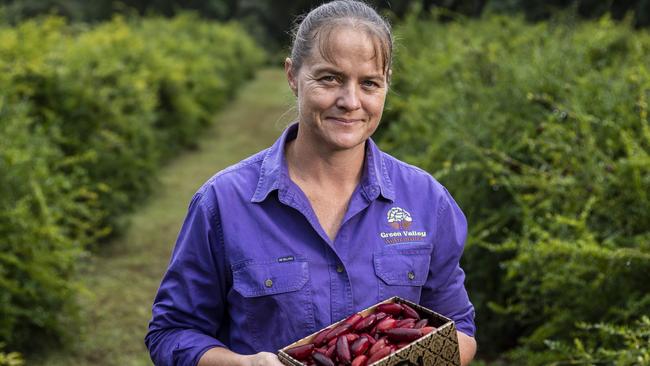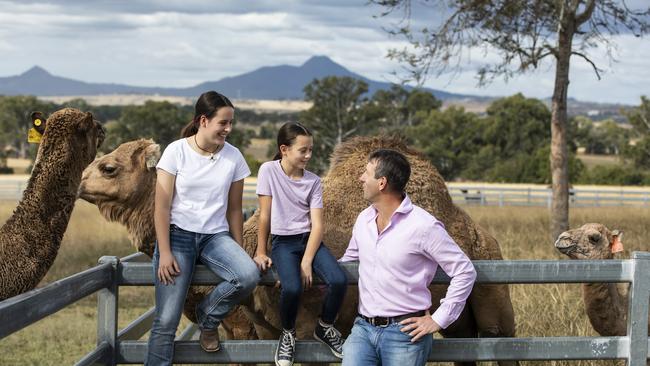How Queensland exporters Walker Seafoods, Summer Land Camels and Green Valley Fingerlimes are finding new markets
Queensland exporters are facing their biggest-ever challenge with the COVID-19 pandemic but they remain determined to hook new customers.

QLD Business
Don't miss out on the headlines from QLD Business. Followed categories will be added to My News.
Queensland exporters are seeking to adapt to the challenges thrown up by the coronavirus pandemic with new markets and products.
About 300 exporters surveyed by Trade Investment Queensland (TiQ) reported they are still optimistic despite the challenges of COVID-19.
Exporters reported strong demand for products related to managing COVID-19 and for products into certain markets not disrupted by the pandemic. Some were shifting to online platforms and adapting their marketing and promotion to adapt to the new environment.
A TiQ spokesperson said the resilience displayed by exporters was impressive, with most expressing optimism about their medium- to long-term prospects when normal trade could resume.
The survey found that 87 per cent of businesses were open to new opportunities, 37 per cent said they were developing new markets internationally and 26 per cent said they were developing new domestic markets
Exporters said key challenges remained domestic lockdown requirements, travel restrictions, reduced demand for fresh produce, freight and logistics issues and loss of supply chains.
But there are chasing new opportunities.
WALKER SEAFOODS AUSTRALIA
One of Queensland’s premier seafood exporters is desperate for regular international flights to restart after COVID-19 cut 80 per cent of the business.
Sunshine Coast’s Walker Seafoods Australia has kept many of its five tuna trawlers tied up at Mooloolaba since the virus shut down Australia’s economy in late March.
Co-owner Heidi Walker says the company, which supplies major wholesalers in the United States and Japan as well as dozens of high-end Australian restaurants, faced international logistics challenges and a lack of demand locally as a result of COVID-19.
“It has massively impacted the business,” she says.
“We can’t get flights even though we have customers wanting fish … I have people ringing me from New York and Boston wanting fish but I can’t get it to them.
“We’re not supplying our major wholesalers.”
A reduction in international passenger flights, which would usually carry Walker Seafood product, has dropped exports to about 20 per cent.
“We usually go in the belly of an aircraft and we’re talking tonnes of freight,” she says.
“We produce so much fish and product we can export.
“Australia feeds the world.”

Walker Seafoods’ domestic market accounts for between 20 and 30 per cent of its business – with its fish served at the Rockpool group restaurants and Saint Peter in Paddington, New South Wales.
Hours for the company’s 50 staff hours have been reduced, but nobody has been laid off.
“We are eligible for a portion of our employees for JobKeeper,” she says.
About 20 Visa holders employed by Walker are not eligible despite working there for four years, Walker adds.
“It’s crazy, they’re full time, they pay their taxes and they’re not eligible,” she says.
Amid the downturn Coles has agreed to stock its tuna at 150 stores across Queensland, New South Wales and Victoria and the company has started selling fish to the public from the back of its Mooloolaba factory.
“It’s not the volume we need to move but it is something,” Walker says.
“If people want to support us we’d love for people to come to our pop-up shop.”
She insisted the business could weather the immediate storm, but hopes things will soon return to normal.
“If it was to go on for a lot longer I don’t know how long we could go on for,” she says.
GREEN VALLEY FINGERLIMES
Jade King’s picturesque farm near Beerwah on the Sunshine Coast had until early this year been providing a steady supply of native fingerlimes to restaurants around the world.
The fruit, whose interior pulp resembles caviar, has become a popular flavour with chefs who can use it to enhance both sweet and savoury dishes.
“I was sending 50kg of the fruit to Italy every fortnight and about 20kg to Singapore,” says King, who operates Green Valley Fingerlimes.
But with restaurants in key markets shut due to the coronavirus shutdown, King has been forced to diversify her business including increasing supply to retail shops and planning to launch new products.

The farm, which also raises cattle and chemical-free fresh produce, has received a grant from the Department of Agriculture to buy equipment that will allow the fruit to be snap frozen.
King says this will extend the shelf life of the limes and expand their uses. “It means it can be added to dishes like yoghurt and icecream,” she says.
She hopes that the export market for limes would eventually recover but even arranging freight services is difficult at the moment,
“Freighting at the moment would be very hit and miss,” she says. “The focus now is on shipping basic produce like carrots and potatoes. Fingerlimes are a top end product so it is not a priority.
“A good thing about the current downturn is that it has forced us to examine the way we do things and look at innovations like snap freezing. That will allow us to eventually get the product into more countries.”
SUMMER LAND CAMELS
Jeff Flood’s sprawling camel dairy on Queensland’s Scenic Rim had just recovered from a devastating drought when the coronavirus pandemic hit.
Flood, whose Summer Land Camels is home to more than 500 animals, had built a successful export business over the past four years exporting milk, skincare products and cheese to Hong Kong, the US and the Middle East as well as offering tours of the 345ha property to foreign visitors.
“The virus has devastated us,” says Flood, who boasts Summer Land is the third-largest camel dairy in the world. “It hit us at the wrong time as we had just come out of 2 ½ years of drought and the bushfires.”

Flood estimates the business has lost $600,000 in lost export orders along with the decimation of its increasingly lucrative tourism business.
“We had got to the stage where we were being recommended by tour organisers and this was resulting in a steady stream of tourists not only from Asia but Europe,” he says.
“We were getting a tour group of 20-45 people a day. It was not only the revenue we got from the tour but what the people spent in the café and shop.”
Flood does not see international tourism returning anytime soon while bricks and mortar retail shops also would be impacted by the pandemic for some time.
He says the dairy was concentrating on online sales which were emerging as one bright spot during the pandemic shutdown.
“People are at home and are becoming more comfortable with ordering products online,” says Flood. “They still need to shower, look after their skin and still need to eat.”
Flood says his business was using the downtime to improve its approach to marketing and develop new products. “We are using social media a lot more to build followers,” he says. “We also are working to develop a first class food offering in our restaurant.”
Flood says Summer Land was working with its China-based brand ambassador Heidi Dugan on starting online sales in China.
“We hope to start online sales to China in six weeks,” he says. “Selling online is not something you just jump into as you can get into terrible strife, but we have used the time to really sharpen our sword.”


